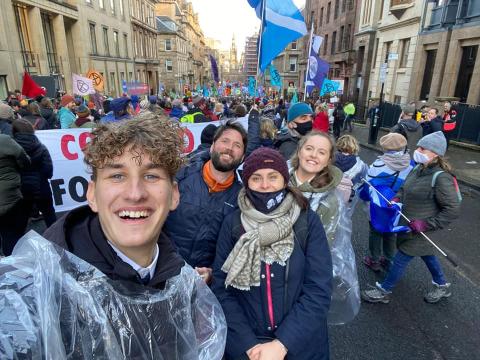
My COP26 sadness is eased by hope in youth, women.
Maurice reflects on his time at COP26 encouraged by now and future leadership of young people and women in affected countries.
On the last evening of my time at COP26 in Glasgow I attended a Climate Vigil in St George's Tron Church in central Glasgow. After a few days of being in the Conference Centre and being one of the 100,000 people who marched for climate justice earlier that day it was a peaceful opportunity to reflect on what I have heard and observed in my time at COP26.
Listening to renowned climate scientist, Dr. Katharine Hayhoe, tell the room how “our future is in our hands” I was struck once again how we all must act in the interest of global solidarity if we are to address to climate crisis and protect the most vulnerable communities and people.
Among the group of us who travelled to Glasgow were two young people from Galway Ireland, Jakub and Ellen, who participate in a project on youth involvement in climate action SAUTI- Youth. The project brings together young people from Tanzania and Ireland sharing lessons of how they hold local government to account for climate action.
Unfortunately, our Tanzanian colleagues were unable to travel due to the logistical challenges brought about by COVID-19 and vaccine inequity. We did arrange to talk to them while we were at COP26 to ensure that we included their messages in our engagements in Glasgow. Their message, along with their Galway colleagues, was simple and straightforward – children and young people must be involved in decisions on climate action. This was a clear call from all the young people I met or heard speak at COP26 – this is not only the right thing to do but it is the smart thing to do.
Young people have much more to offer to the discussions that they are given credit for and indeed it is their right to be involved in decisions that impact their lives. It is positive to see youth engagement recognised in the final COP Decision and in the Action for Climate Empowerment decision taken at COP26.
A COP is a noisy place, not just because there are 30,000 delegates but because there is a myriad of events and meetings arranged in the margins. You need to figure out your structured expert dialogue from your discussion on ambition and the side event that you are asked to be at. But they are also an opportunity to meet old friends and new.
This year I had the pleasure of spending time with old friends Agnes Leina from Kenya and Ambassador Dessima Williams from Grenada – both formidable women in their work for climate justice. I also had the opportunity to meet Rosemary Atieno from Kenya and learn about the great work she is doing with the Women’s Climate Centres in East Africa.
A common theme from these discussions is that women on the frontline of the climate crisis are those showing the most leadership in the response to climate change. They are working with their communities to answer the challenge - one which the are least responsible for causing. Access to funding is a core issue, we had many discussions in the midst of the numerous new pledges of funding wondering how this would flow to the local level and how it would make a difference in the most vulnerable communities.
One of the fundamental issues many of us going to COP26 this year had an eye on was ambition and finance. These we know are essential if we are to reach to goals set out in the Paris Agreement. While there was some progress made at COP26 I am not sure we can claim it has been a huge success or one that sets us on a safer path.
As I write this, I am sitting listening, with some sadness, to the closing statements of the Conference. To come to a consensus with over 190 countries it is obvious that compromises have to be made, but it seems the compromises of a small island state is far more than that of a large developed nation – the representative from the Maldives summed it up best saying of the final agreement "We put our homes on the line while those who have other options decide how quickly they want to act" .
But we must have hope, hope in the young people I travelled with, hope in the women leading their communities, hope that multilateral processes will deliver the ambitions action we need. Returning to the Climate Vigil where Dr. Hayhoe reminded us of 2 Timothy 1:7, "For God hath not given us the spirit of fear; but of power, and of love, and of a sound mind" let us hope our leaders sound minds prevail.
To quote another formidable climate champion, Ambassador Rita Mishaan, Guatmeala: “We must do the right thing because it is the right thing to do!”
Maurice Sadlier is World Vision Ireland’s Programmes Director and has overall responsibility of World Vision's development and humanitarian Programmes. He is a development specialist with a background in programme management including climate justice, health, nutrition and livelihoods programmes. Follow Maurice at @mauricesadlier
Image: L to R Jakub, Maurice and Ellen (far right) join Leti the Youth Officer from SAUTI in Galway on the march for climate justice.